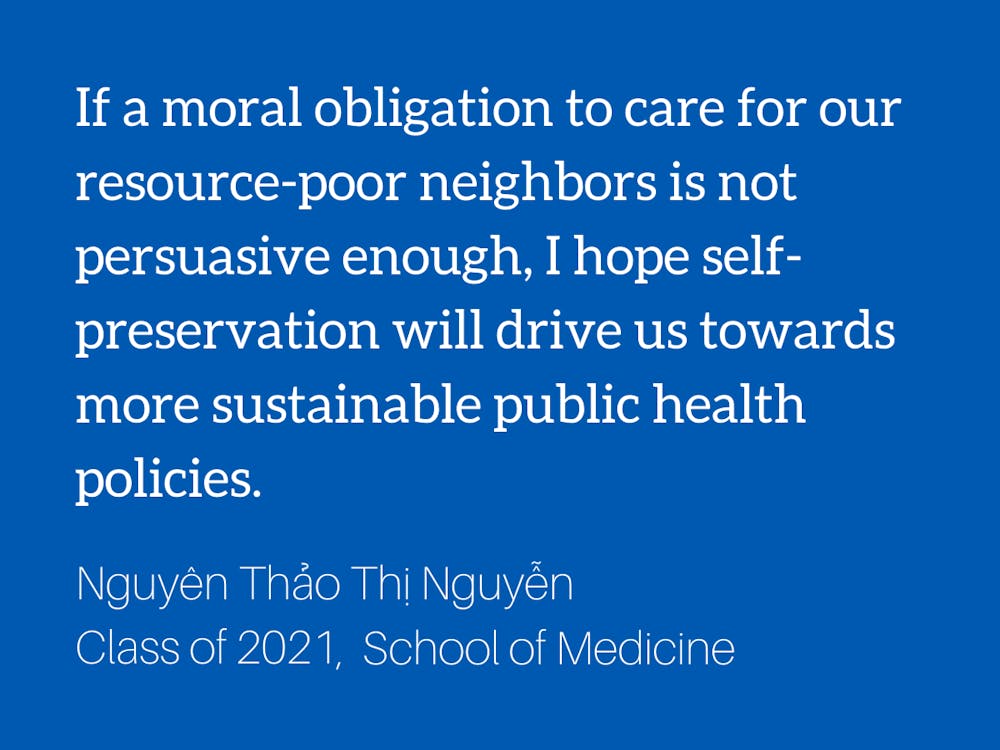There’s something about pandemics that prompt us to draw divisions, in particular along national lines—whether it’s the “Spanish" flu of 1918 (that actually did not originate from Spain), the "Hong Kong" Influenza pandemic of 1968, or the “Chinese” COVID-19 pandemic that now affects us. With the emergence of the present nation-state system that requires passports for international travel, assigning nationality to pathogens represents our naive hope that illness will respect these imagined borders.
We saw these nationalist lines drawn again last week when reporter Weijia Jiang asked President Trump why he sees testing as a global competition to which he responded, "Maybe that's a question you should ask China.” In a world that seeks to define individuals based on nationality—oftentimes incorrectly imposing identities based on appearance—Jiang, a self-described Chinese-born West Virginian, represents the complexity of national identity and also the possibility of international collaboration. Indeed, we have seen during this pandemic Asian Americans using their cultural heritage to assist the pandemic response stateside, such as Maryland First Lady Yumi Hogan negotiating with South Korea to procure COVID-19 test kits for her state. Yet, instead of envisioning these possibilities, Trump instead chose to deepen national divisions.
It should be no surprise that the administration that campaigned to build walls along our borders would respond in this way. Yet, it’s concerning that in times of crisis, these divisions have dominated our national response. Border-centered public health policies, such as the Chinese travel restrictions, which excluded U.S. nationals and failed to provide a plan for their repatriation, are not effective given the modern-day permeability of our borders. Nation-states are obligated to provide sanctuary for its citizens, and we forget that viruses are constrained by neither nationality nor borders.
By allowing national divisions to guide our policies, we have created an “us” versus “them” construct which has allowed political leaders to cast blame and justify our self-preservation, whatever the cost. By characterizing various groups as “other,” we lessen the moral burden of our behavior. It allows us to turn a blind eye to the consequences of our actions, enabling us to hoard resources at the expense of the Global South.
We forget the lessons we’ve learned from previous outbreaks, in which international collaboration proved to be key in curbing global losses. During the Ebola pandemic, for example, the U.S. was the largest single-country donor to response efforts in Democratic Republic of the Congo and neighboring countries. In doing so, we were able to assist with control efforts at the outbreak epicenter, providing much-needed aid to resource-constrained countries, and moreover, were able to minimize the impact on U.S. soil.
Ultimately, if a moral obligation to care for our resource-poor neighbors (many of whom have been affected by U.S. colonization) is not persuasive enough, I hope self-preservation will drive us towards more sustainable public health policies. In times of pandemic, we need to realize our position in an interconnected international web, in which virtually no corner in the world is too remote to leave us unaffected, and as such, international collaboration is more necessary than ever to contain pathogen spread. As we seek to recover from this pandemic globally, I hope that we are able to find the “we” in our pursuit of collective healing.
Nguyên Thảo Thị Nguyễn is a Trinity College alumna (T’16) and a current M.D. candidate at the Duke University School of Medicine, Class of 2021.
Get The Chronicle straight to your inbox
Signup for our weekly newsletter. Cancel at any time.
Nguyên Thảo Thị Nguyễn is Trinity College alumna (T’16) and a current MD candidate at the Duke University School of Medicine, Class of 2021.

